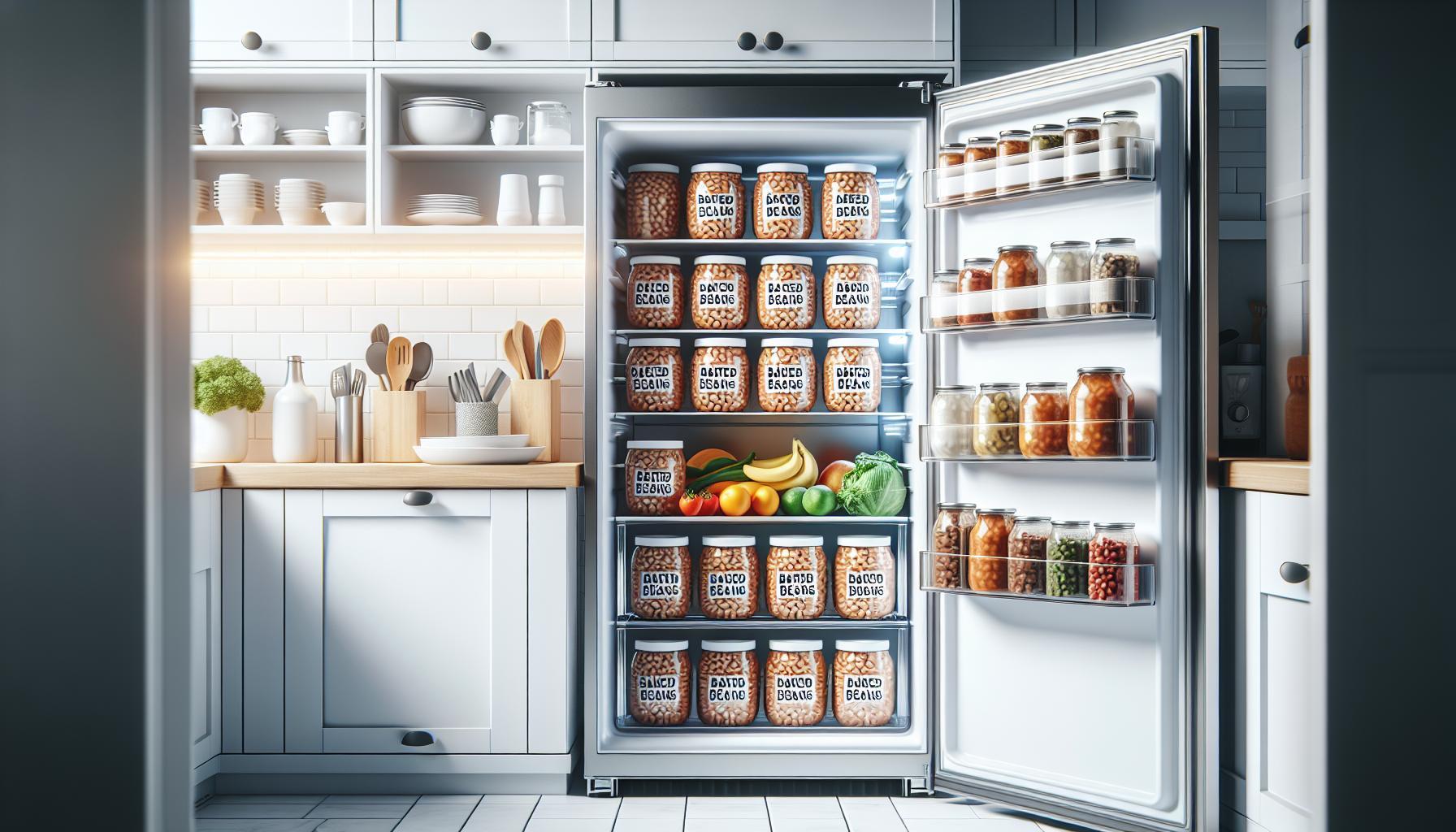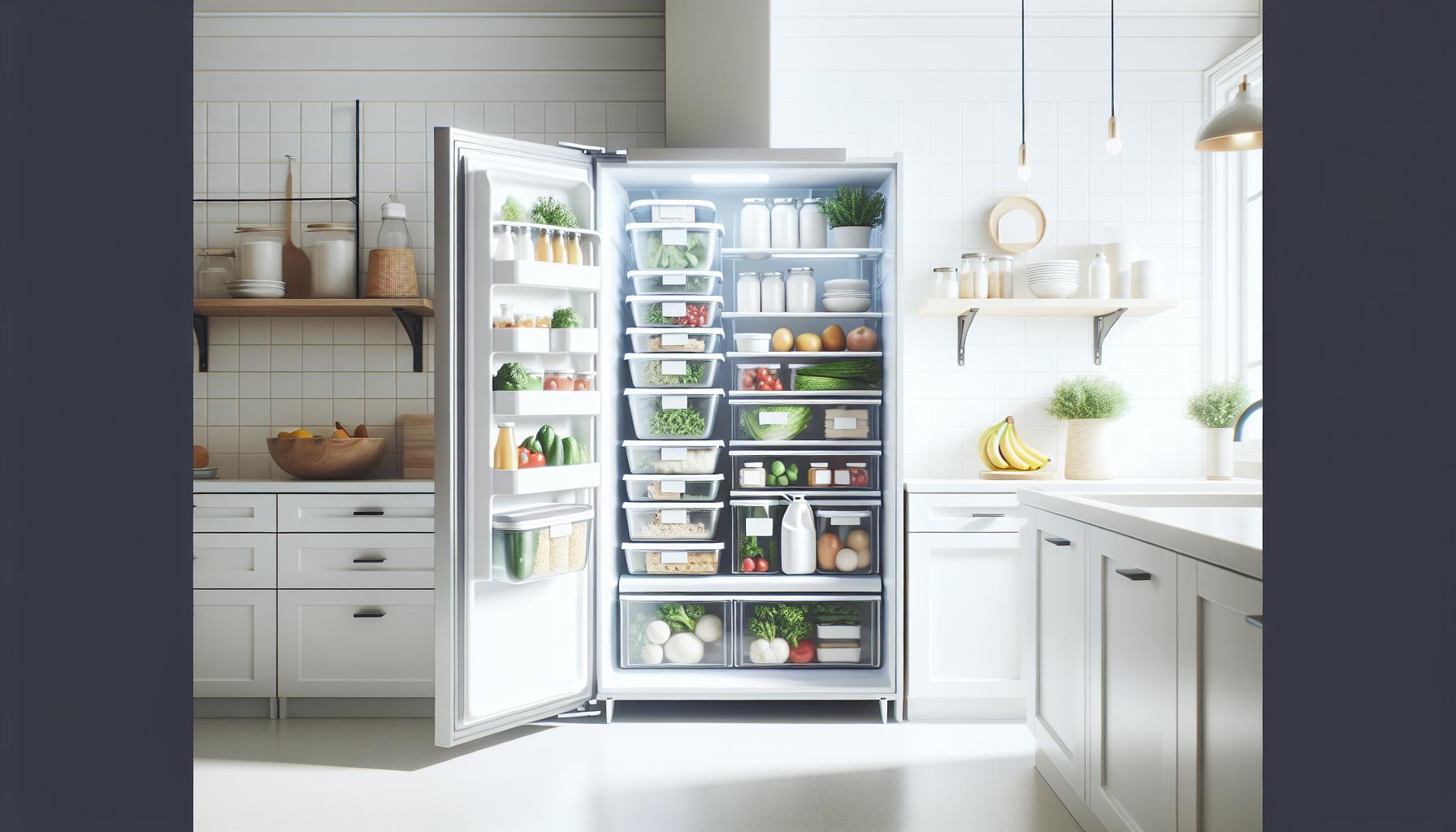Did you know that baked beans can be a delicious staple in your fridge but require careful handling to maintain their quality? Understanding how long baked beans last in the fridge is essential for both food safety and enjoying their best flavor. Whether you’re working with homemade or store-bought options, knowing the proper storage times can help you prevent waste and ensure that you’re serving safe, tasty meals.
As you delve into this guide, you’ll discover practical tips for storing baked beans, including timelines for refrigeration and signs of spoilage. This knowledge will empower you to make informed decisions, so you can savor the hearty goodness of baked beans without worry. Let’s explore the best practices for storing this classic dish safely, ensuring that each scoop is both delightful and fresh.
Storage Life of Baked Beans: What to Expect
When it comes to storing baked beans, understanding their shelf life can help maximize their flavor and safety. Typically, homemade baked beans can last in the fridge for about 3 to 5 days. This time frame allows for optimal freshness, as the quality decreases gradually after cooking. To maintain the tastiness of your dish, it’s important to refrigerate them promptly within two hours of cooking to reduce bacterial growth.
For canned baked beans, the story changes slightly. Once opened, they should also be stored in the refrigerator and consumed within 3 to 4 days for best quality. If you have unopened cans, they can last for years in your pantry, thanks to preservatives and the canning process. However, always check the expiration date on the can for best results.
To make the most of your baked beans, consider portioning leftovers into smaller airtight containers. This not only makes it easier to pull out a quick meal but also minimizes exposure to air and bacteria when you’re scooping servings. If you find yourself with more beans than you can eat within a week, freezing is a viable option, where cooked baked beans can last for up to 3 months when stored properly. Be sure to cool them entirely before freezing to prevent ice crystal formation that can affect texture.
By following these guidelines, you can ensure that your baked beans remain flavorful and safe to eat, allowing you to enjoy one of your favorite comfort foods without worry.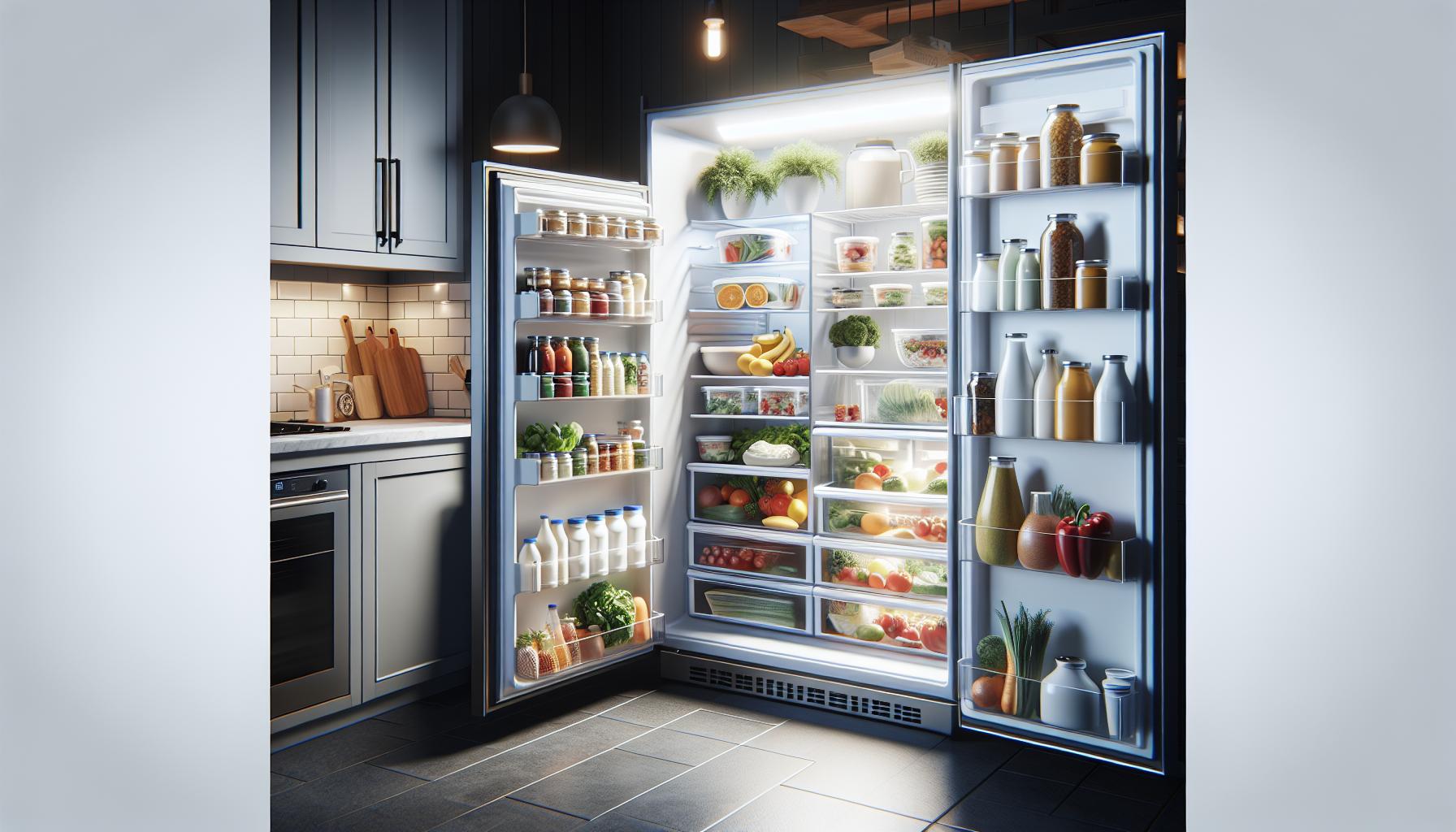
Understanding Proper Fridge Temperature for Food Safety
Food safety is critical when it comes to storing leftovers, especially perishable items like baked beans. The ideal refrigerator temperature is essential in preventing bacterial growth and ensuring these delicious legumes remain safe to eat. The USDA recommends keeping your fridge at or below 40°F (4°C). This temperature helps to inhibit the growth of harmful microorganisms that can cause foodborne illnesses. Regularly check your fridge’s temperature using an appliance thermometer to ensure it remains within this safe zone.
When you store baked beans, remember that the quicker you cool them down and place them in the fridge, the better. They should be refrigerated within two hours after cooking to maintain quality and safety. If the room temperature exceeds 90°F (32°C), such as during a summer cookout, aim to refrigerate them within just one hour. This rapid cooling process significantly reduces the chance for bacteria to multiply, keeping your food safe for consumption.
For optimal storage, place baked beans in shallow containers to allow them to cool quickly and uniformly. Avoid overcrowding the refrigerator and keep items well-spaced to support adequate airflow, which helps maintain consistent temperatures throughout the fridge. If you frequently store foods, consider checking the fridge’s temperature settings weekly to prevent any unforeseen fluctuations that could compromise food safety. By adhering to these guidelines, you will significantly extend the life of your baked beans while ensuring they remain delicious and safe to eat.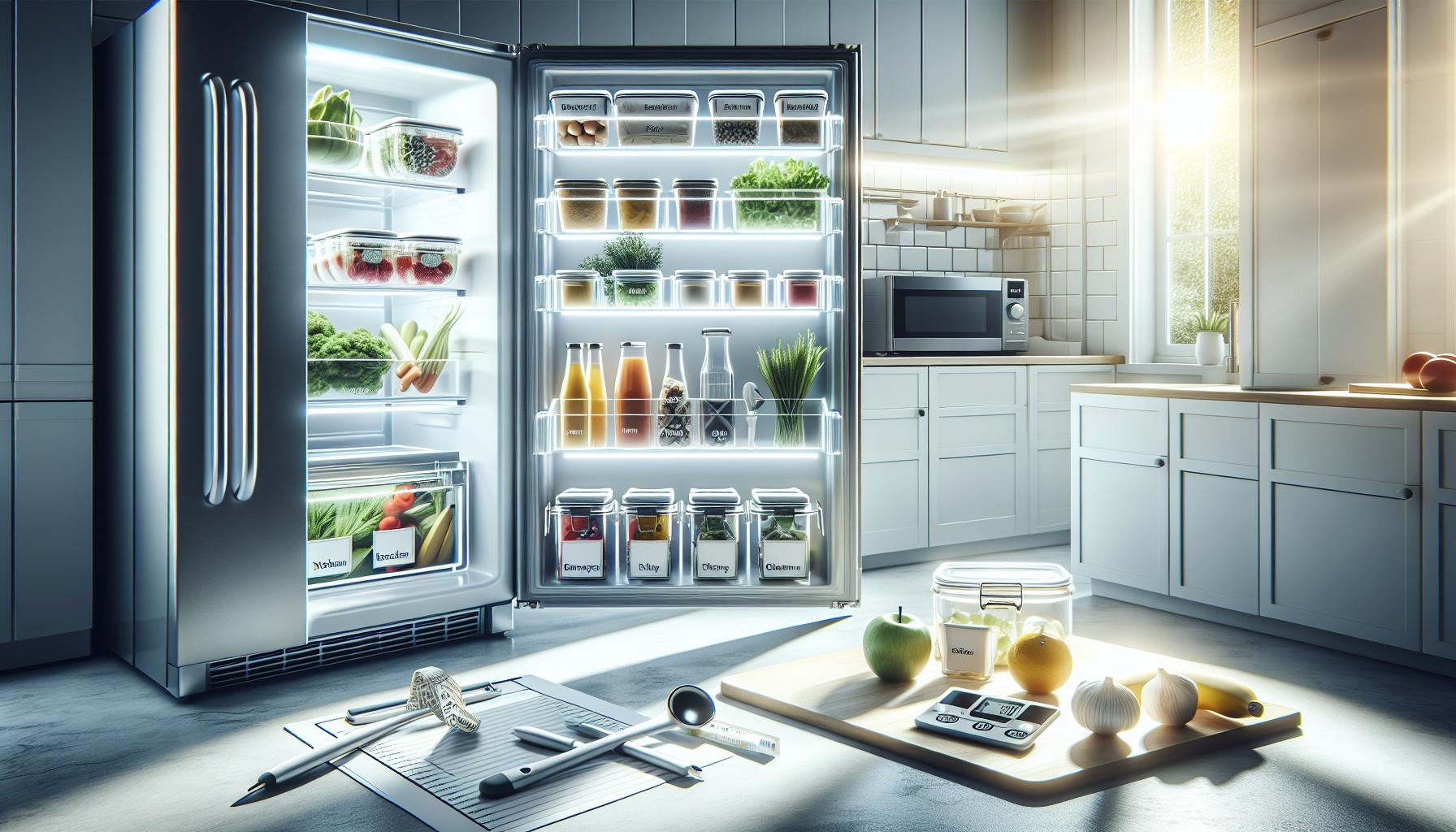
Signs Your Baked Beans Have Spoiled
While baked beans are a hearty and delightful dish, it’s crucial to recognize the warning signs of spoilage to ensure food safety. Understanding these indicators protects your health and keeps your meals enjoyable. Some common signs that your baked beans have gone bad include an off smell, a change in color, and the presence of mold.
One of the first things to observe is the aroma. Fresh baked beans typically have a rich, savory scent. However, if they emit a sour or rancid odor, it’s a clear signal that bacteria might have proliferated, and the beans are no longer safe to consume. Next, examine the color; anything that resembles a darker, more muted hue than when they were originally cooked can indicate spoilage. Fresh beans should maintain their vibrant colors, and any discoloration may suggest they’ve been compromised.
Another vital check involves the texture. If you notice any unusual sliminess or separation, it’s wise to discard the beans. Mold is also a major indicator of spoilage-if you spot any fuzzy growth, it’s essential to throw them away immediately since consuming moldy foods can lead to significant health risks.
With baked beans generally lasting 3 to 5 days in the fridge when stored properly, being vigilant about these signs can help you enjoy this delicious side dish safely. Always remember: when in doubt, it’s better to err on the side of caution and dispose of questionable food. Keeping safety as a priority ensures that your mealtime is pleasant and worry-free.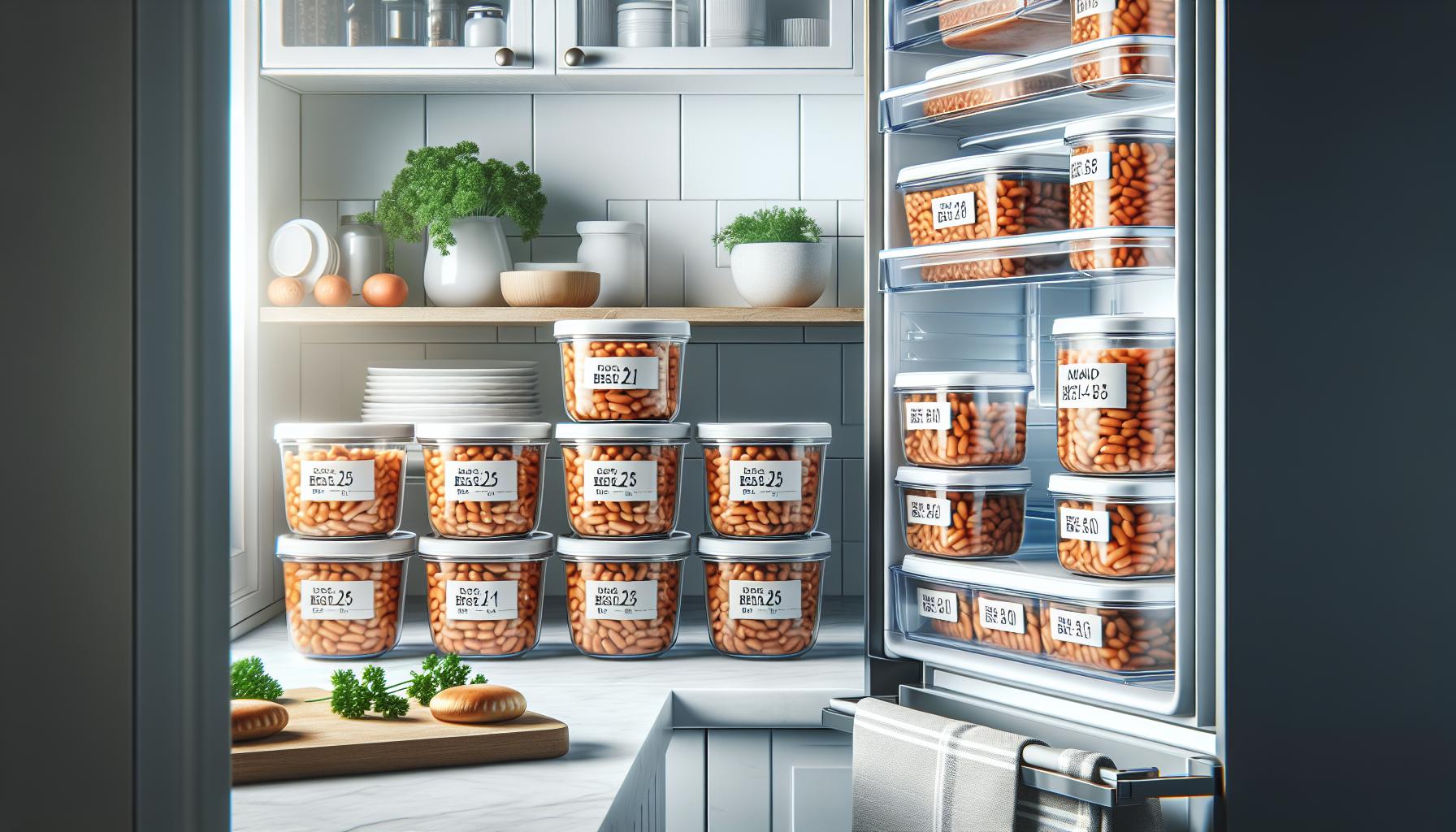
How to Store Leftover Baked Beans Safely
To ensure your leftover baked beans remain fresh and safe to eat, proper storage is essential. Baked beans can be a fantastic side dish or main course, but improperly stored leftovers can lead to spoilage, which defeats the purpose of enjoying your meal later on. Start by allowing the beans to cool to room temperature; this prevents condensation, which can lead to moisture buildup and promote bacterial growth.
Once cooled, transfer the beans into a suitable airtight container. Glass or BPA-free plastic containers work best, as they do not react with the food, ensuring no unwanted flavors are absorbed. Always use a clean spoon to serve, avoiding contamination from other dishes, which can introduce bacteria. Label your container with the date of storage to keep track of freshness, aiming to consume your leftovers within 3 to 5 days for optimal quality and safety.
Storage in the fridge should ideally be at or below 40°F (4°C). Keeping your refrigerator at the right temperature is critical for reducing the risk of foodborne illness. Avoid overcrowding your fridge to ensure proper air circulation, which helps maintain an even temperature throughout. If you want to extend the longevity of your baked beans even further, consider freezing them; when properly stored in an airtight container, they can last up to six months in the freezer, allowing for flexibility in meal planning.
In short, to safeguard your delicious baked beans:
– Cool beans before storage.
– Use airtight containers to seal in freshness.
– Keep in the fridge at or below 40°F (4°C).
– Consume within 3 to 5 days; consider freezing for longer storage. This approach not only maintains safety but also helps to preserve the flavor and quality of your baked beans for future enjoyment.
The Best Containers for Storing Baked Beans
To keep baked beans fresh and tasty, choosing the right storage container is crucial. The best containers not only prevent spoilage but also maintain the flavor and texture of your beans. Glass containers and BPA-free plastic containers are top choices, as they are non-reactive and do not absorb odors or flavors from the food. Their airtight seals help keep air out, which is essential for preventing the growth of bacteria and maintaining the beans’ moisture.
Key Factors to Consider
When selecting a container for your baked beans, consider the following factors:
- Airtight Seal: Ensure the container has a tight-fitting lid to prevent air and moisture from entering.
- Material: Opt for glass or high-quality BPA-free plastic. Avoid metal containers, as they can react with acidic foods, altering the taste.
- Size: Choose a container that fits the amount of beans you have, minimizing air space. This helps them stay fresher for longer.
- Freezer-Friendly: If you plan to freeze your baked beans, ensure the container is marked as freezer-safe. This will withstand lower temperatures without cracking.
Storage Tips
Before transferring your baked beans to the container, allow them to cool to room temperature to minimize condensation. Once stored, label the container with the date, as baked beans are ideally consumed within 3 to 5 days when refrigerated. If you’re looking to store them longer, remember that baked beans can last up to six months in the freezer if placed in a suitable freezer-safe container. By following these guidelines, you can safely enjoy your delicious baked beans at a later date without sacrificing quality or taste.
Freezing Baked Beans: Tips and Techniques
When it comes to preserving the deliciousness of baked beans, freezing is an excellent option that allows you to enjoy this comfort food long after it has been made. Freezing not only extends the shelf life of baked beans but also keeps them at their best taste and texture. Here are some essential tips and techniques to ensure your baked beans freeze successfully and can be reheated without a significant loss of quality.
Before freezing, allow your baked beans to cool to room temperature to avoid condensation inside the storage container, which can lead to freezer burn. Portioning your beans into smaller containers can be practical; this way, you only thaw what you need. Use containers that are specifically designed for freezing-these are typically made from heavy-duty plastic or glass and are resistant to cracking at low temperatures. Remember to leave some headspace in your containers, as beans expand when they freeze.
To further protect your beans, consider wrapping them in plastic wrap or placing them in freezer bags before placing them in the containers. This can provide an additional layer of protection against freezer burn. For extra convenience, label each container with the date, and if you wish, the type of bean dish it contains, so you can quickly identify and use it later. Baked beans can be safely stored in the freezer for up to six months, although they may remain safe beyond that timeframe; for the best quality, it’s recommended to consume them within this window.
When you’re ready to enjoy your frozen baked beans, the best method for reheating is to first thaw them in the refrigerator overnight. If you’re short on time, you can thaw them in the microwave-just be sure to use a microwave-safe container and cover them to avoid splattering. Reheat thoroughly on the stove or in the microwave until they reach an internal temperature of 165°F (74°C). Avoid refreezing baked beans once they have been thawed, as this can compromise both safety and flavor. By following these freezing guidelines, you’ll ensure your baked beans remain both delicious and safe to eat.
Reheating Baked Beans: Do’s and Don’ts
Reheating baked beans can be a straightforward task if done correctly, ensuring that you enjoy their rich flavor while keeping safety at the forefront. The goal is to rewarm your beans to a safe internal temperature of 165°F (74°C) while preserving their taste and texture. Here’s how to do it effectively.
Start by transferring your baked beans to a microwave-safe dish or a saucepan. If you’re using the microwave, cover the beans with a microwave-safe lid or plastic wrap, leaving a small vent for steam to escape. This prevents splattering and allows even heating. Heat in short intervals of about 1 to 2 minutes, stirring in between to promote even heat distribution. Alternatively, when using the stovetop, gently warm the beans over low heat, stirring frequently to avoid scorching at the bottom. For both methods, ensure the beans are heated thoroughly before serving.
While reheating, remember some key do’s and don’ts:
- Do check the temperature regularly with a food thermometer to ensure safety.
- Do add a splash of water or broth if the beans look dry; this will help maintain moisture and flavor.
- Don’t reheat multiple times. Always heat only the amount you will consume to prevent bacterial growth.
- Don’t reheat baked beans directly from frozen without thawing, as uneven heating can lead to cold spots where bacteria can thrive.
By following these simple guidelines, you can enjoy your baked beans safely and deliciously the next day or after they’ve been stored. Being mindful of food safety not only safeguards your health but also enhances your dining experience.
Health Risks of Improperly Stored Baked Beans
Improper storage of baked beans can lead to significant health risks due to the potential growth of harmful bacteria. When baked beans are left at room temperature for too long or are not stored correctly in the refrigerator, bacteria such as Bacillus cereus and Clostridium perfringens can multiply rapidly, resulting in foodborne illnesses. Symptoms of these infections often include abdominal cramps, diarrhea, and vomiting, which can be particularly severe for vulnerable individuals such as children, the elderly, or those with compromised immune systems.
To minimize the risk, it’s essential to adhere to proper storage guidelines. Baked beans should be refrigerated within two hours of cooking if they are not consumed immediately. Ideally, they should be stored at a temperature below 40°F (4°C). If you’re unsure about the beans’ freshness, remember that baked beans generally last in the fridge for about three to four days. It’s wise to use airtight containers to prevent exposure to air, which can promote bacterial growth.
Signs of Spoilage
Always be vigilant for signs of spoilage before consuming stored baked beans. If you notice any off-smells, unusual colors, or mold growth, discard the beans immediately. Trust your senses; when in doubt, it’s safer to throw it out. Moreover, reheating beans doesn’t kill all toxins produced by bacteria, so ensuring that they have been stored properly is crucial.
Taking these precautions will help you enjoy your baked beans safely. Prioritize food safety practices, as they not only protect your health but also enhance your overall eating experience.
Frequently Overlooked Facts About Canned Baked Beans
Many people reach for canned baked beans as a quick and convenient meal option, yet several common misconceptions can lead to improper storage and food safety concerns. One of the most frequently overlooked aspects is the impact of the canning process itself. Canned baked beans are preserved in a sealed environment that effectively inhibits the growth of harmful bacteria. However, once the can is opened, the contents must be treated with the same caution as fresh food. It’s crucial to consume leftovers promptly or store them properly, as bacteria can rapidly multiply once exposed to air.
Canned baked beans often come with sell-by dates, but these dates can be misleading. These dates are not indicators of food safety, rather they denote peak quality. The beans can still be safe to consume even after the sell-by date has passed, provided that the can remains undamaged and is stored appropriately in a cool, dry place. However, once opened, they should be refrigerated and consumed within 3 to 4 days. This period ensures that you retain the best flavor and texture while minimizing food safety risks.
Another key point to consider is the proper storage techniques after opening a can of baked beans. It’s not advisable to leave the opened beans in the original can; instead, transferring them to an airtight container protects them from contamination and preserves their flavor. Additionally, always cool the beans to room temperature before refrigerating them, as placing hot food directly in the fridge can raise the overall temperature and compromise the safety of other stored items.
An unexpected fact is that canned baked beans can even be frozen for extended storage. If you find yourself with leftovers, consider portioning them into freezer-safe containers. Properly stored, they can last up to 6 months in the freezer without significant loss of quality. When you’re ready to enjoy them again, simply thaw in the fridge or use gentle heating methods to reheating them perfectly. This not only extends the lifespan of your canned baked beans but also helps minimize food waste, making it a smart option for any pantry.
What Happens When You Ignore Storage Guidelines?
Ignoring storage guidelines for baked beans can lead to more than just an unappetizing meal; it can pose significant health risks. When leftover baked beans are not stored correctly, they can become a breeding ground for bacteria like Clostridium perfringens and Bacillus cereus, both of which can cause foodborne illnesses. These pathogens multiply rapidly at room temperature, so if you leave your baked beans out longer than the recommended two hours, you’re increasing the likelihood of contamination.
To ensure food safety, it’s vital always to store leftover baked beans in an airtight container and refrigerate them promptly. The general rule is to consume them within 3 to 4 days. If you ignore this timeframe, you not only risk spoilage but also may encounter unpleasant odor and taste changes. Spoiled beans may exhibit a sour smell and discoloration, indicating they should be discarded. In extreme cases of neglect, such as leaving beans in a warm environment for days, you might even experience the growth of mold, which is another clear sign that the food is unsafe to eat.
Apart from health concerns, improperly stored baked beans can lead to wastefulness. Each time food spoils due to poor storage, you’re throwing away money and resources. When preparing baked beans, consider portioning your leftovers into smaller containers for easier storage and reheat them in amounts that ensure you enjoy them while they are at their best. By adhering to storage guidelines, you protect not only your health but also your pocketbook.
In conclusion, always respect the recommended storage practices for baked beans. The benefits far outweigh the convenience of ignoring them, ensuring that your food remains safe to eat and enjoyable every time you serve it.
Comparing Homemade vs. Canned Baked Beans Storage
When it comes to baked beans, understanding the differences in storage and shelf life between homemade and canned versions is crucial for maintaining food safety and quality. While both types of baked beans can be delicious staples, they have different characteristics that affect how long they can be kept after preparation or opening.
Homemade baked beans can generally be stored in the refrigerator for about 3 to 4 days. After this period, the risk of spoilage increases, particularly if they are not stored properly in an airtight container. If you want to extend their longevity, consider freezing them, which can prolong their shelf life to about 6 months. However, homemade beans often contain fewer preservatives than canned varieties, meaning their freshness is more susceptible to environmental factors. It’s essential to ensure they cool down to room temperature before storage to reduce condensation in the container, which can lead to spoilage.
In contrast, canned baked beans bring the convenience of longer shelf life and ease of storage. When unopened and kept in a cool, dry place, canned beans can last for years beyond their “best by” date. Once opened, they can be refrigerated for up to 3 to 4 days, similar to their homemade counterparts. However, commercial canned beans possess preservatives that help inhibit bacterial growth, making them slightly more forgiving if left stored for a few extra days, provided they show no signs of spoilage.
Understanding these differences is key to enjoying baked beans safely. Always check for signs of spoilage, such as off odors or changes in color, regardless of whether you’re dealing with homemade or canned beans. By following proper storage guidelines, you can enjoy your baked beans while also ensuring food safety and quality.
Frequently asked questions
Q: How long can I keep baked beans in the fridge?
A: Baked beans can last in the fridge for about 3 to 5 days when stored properly in an airtight container. For extended storage, consider freezing them, which can retain their quality for several months.
Q: Can I eat baked beans after the expiration date?
A: Eating baked beans after the expiration date depends on proper storage. If refrigerated and they show no signs of spoilage, they may still be safe to eat shortly after the date, but always check for any off smells or appearances before consuming.
Q: What is the best way to reheat baked beans?
A: The best way to reheat baked beans is on the stovetop over medium heat, stirring frequently for even heating. If using a microwave, place them in a microwave-safe dish and heat in short intervals, stirring between to prevent uneven heating.
Q: Can I store baked beans in their can once opened?
A: No, once opened, baked beans should be transferred to an airtight container for storage in the fridge. Storing them in the can can cause the beans to develop a metallic taste and may compromise their quality.
Q: How can I tell if my baked beans are spoiled?
A: Signs of spoiled baked beans include an off smell, discoloration, mold, or a change in texture. If you notice any of these signs, it’s best to discard them to avoid foodborne illness.
Q: Is it safe to freeze baked beans?
A: Yes, it is safe to freeze baked beans. Make sure to use an airtight container or freezer bag to prevent freezer burn, and consume them within 3 to 6 months for the best quality.
Q: What should I do if my baked beans smell bad after being stored?
A: If baked beans emit a bad smell after being stored, they should be discarded immediately, as this indicates spoilage. Never taste them to check for safety.
Q: Are homemade baked beans different in shelf life compared to canned ones?
A: Yes, homemade baked beans typically have a shorter shelf life of about 3 to 5 days in the fridge, while canned baked beans can last longer due to preservatives. Store both properly to ensure safety and quality.
Wrapping Up
Now that you know how long baked beans last in the fridge and the best ways to store them safely, you can avoid food waste and ensure your meals are both delicious and safe. For optimal flavor and safety, remember to consume your refrigerated baked beans within 3-5 days. If you’re curious about extending their shelf life, consider freezing them-check out our article on “Freezing Cooked Beans: What You Need to Know” for tips!
Don’t let food storage questions linger-find fast answers by exploring our comprehensive guides on food safety and preparation that ensure you make the most of your leftovers. Have any storage tips or personal experiences to share? Join the conversation in the comments below, and don’t forget to subscribe to our newsletter for more practical food storage insights that keep your kitchen running smoothly. Your knowledge about safe food practices can elevate your cooking experience and keep your loved ones safe!

